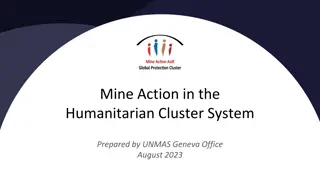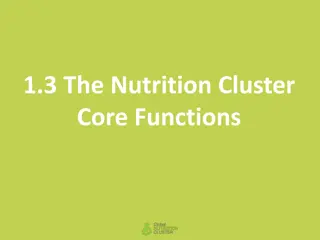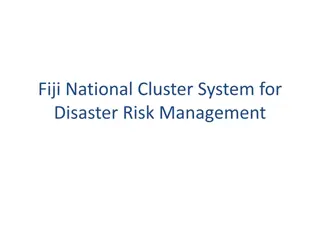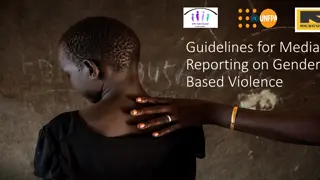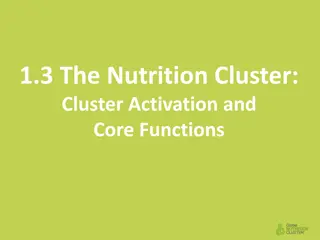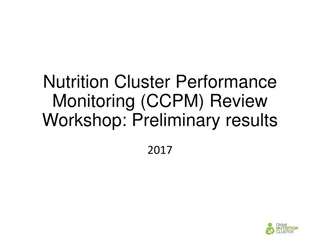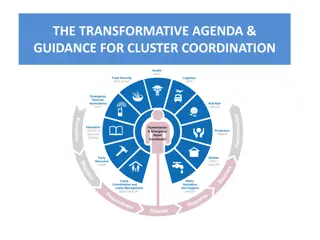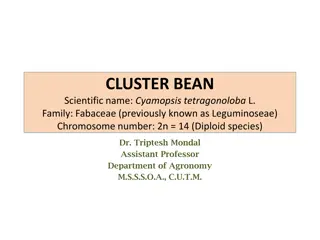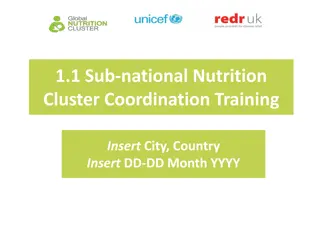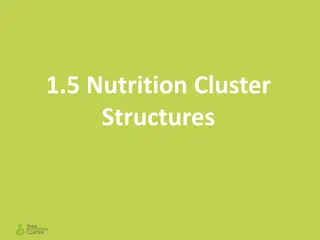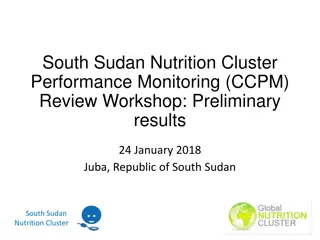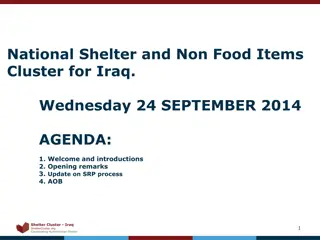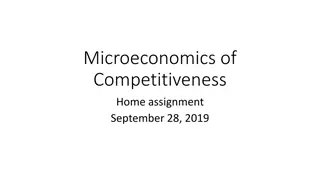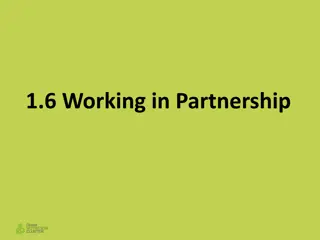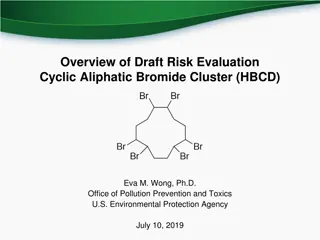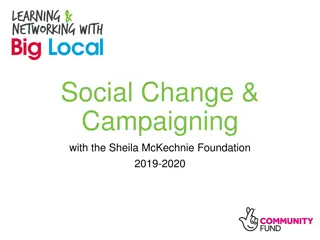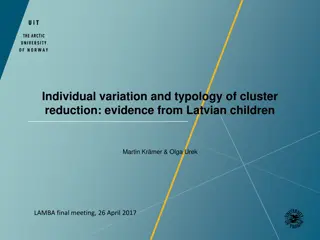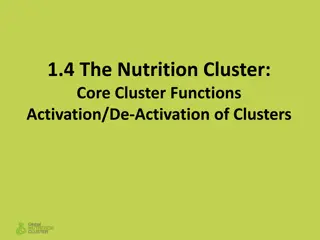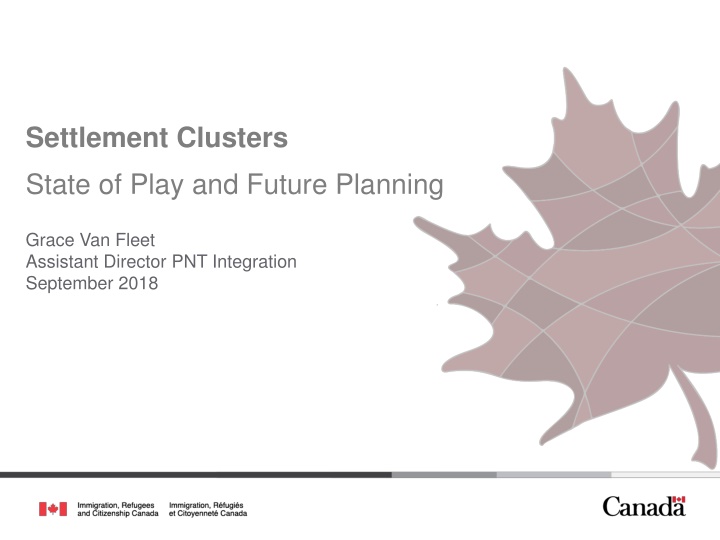
Settlement Clusters: Current State and Future Planning
This document outlines the establishment of settlement clusters, groupings of service providers delivering similar services to vulnerable populations across 5 PNT jurisdictions. It discusses the accomplishments, future plans, challenges, and opportunities related to these clusters. Responsibilities are assigned to the PNT Management Team, steering committees, and IRCC program officers. The initiative aims to address inconsistencies in programming and service availability while enhancing support for vulnerable communities.
Download Presentation

Please find below an Image/Link to download the presentation.
The content on the website is provided AS IS for your information and personal use only. It may not be sold, licensed, or shared on other websites without obtaining consent from the author. If you encounter any issues during the download, it is possible that the publisher has removed the file from their server.
You are allowed to download the files provided on this website for personal or commercial use, subject to the condition that they are used lawfully. All files are the property of their respective owners.
The content on the website is provided AS IS for your information and personal use only. It may not be sold, licensed, or shared on other websites without obtaining consent from the author.
E N D
Presentation Transcript
Settlement Clusters State of Play and Future Planning Grace Van Fleet Assistant Director PNT Integration September 2018
Table of Contents What are the clusters? Why have we initiated this work? What has been accomplished thus far? What is planned for the future? Challenges? Opportunities? Questions 2
What are the clusters? Groupings of providers across the 5 PNT jurisdictions who deliver similar services, provide specialized services to a potentially vulnerable clientele, or who have similar community/institutional characteristics Similar Services Vulnerable Clientele Community / Institutional Characteristics Language Assessment Youth - - - Small Centers SWIS Critical Hours Summer Programs Language - Formal - Blended - Informal Newcomer Women Post-Secondary Institutions Case Management LGBTQ LIPS Community Connections - Volunteer Engagement - Mainstream Engagement - Connecting newcomers to Canadians Disability Francophone Services Employment/Mentorship - Employment Counselling - Employer Engagement Refugees Settlement in the North Needs Assessment Seniors RAP Information / Orientation Support Services - Childminding - Transportation - Interpretation/Translation - Crisis Counselling 3
Who is responsible for the clusters? A member of the PNT Management Team has been tasked with leading the development of each cluster. A steering committee comprised of representatives from SPOs across the region works with the PNT lead on developing and implementing a work plan for the cluster. The annual host of the learning events (where applicable) develops an advisory body with local and regional representation to develop survey of needs from all relevant organizations/settlement staff which in turn guides the content of the learning events. Internal working groups of IRCC program officers responsible for contribution agreements delivering similar services/serving similar clienteles, or with similar community/institutional characteristics are currently being formed. 4
Why have we initiated this work? Inconsistencies in 2012-2017 CAs for similar programming across 5 PNT jurisdictions. Inconsistency in professional development opportunity across providers. Inconsistency in service availability between large urban centers and smaller centers. Very little previous work on outcomes undertaken. Desire to enhance services for vulnerable populations. Few opportunities existed in the past for PNT settlement agencies delivering similar services to connect across jurisdictional lines. Both Ontario and BCY have utilized this approach to great effect in the past to build communities of practice, identify and generalize best practices, and to conduct evaluations to guide future service planning and delivery. Opportunities for investment where priorities are identified. Winter is coming. 5
What has been accomplished thus far? Learning Events Francophones (Winnipeg July 2018; Whitehorse August 2018; Calgary, Regina and Winnipeg Fall 2018) Refugees/RAP (Lessons Learned 2016; Ottawa February 2017; Resettlement Day of Integration Summits 2017; PSR meeting Winnipeg December 2018) Case Management (Winnipeg February 2017; Teleconference August 23, 2017; Lethbridge March 2018; Saskatoon October 2018) Youth (Calgary March 2017; Regina June 2017) Newcomer Women (Calgary March 2017); planned for Saskatoon 2019) Small Centers (Brandon June 2017; Red Deer March 2018; Moose Jaw 2019) LGBTQ (Calgary September 2017; Calgary March 2018) Language (Edmonton 2018; Winnipeg May 2019) Language Assessment (Winnipeg October 2017; Saskatoon October 2018) Employment-related Services (Calgary March 2018) Post-secondary institutions (teleconference September 2017; Swift Current 2019) North (Yellowknife October 2016; Iqaluit December 2017; Whitehorse August 2018; NWT 2019) LIPs (Calgary September 2016; Regina June 2017; Calgary March 2018; Bow Valley 2019) Disability (Teleconference August 23, 2017; Best practices teleconference Fall 2018) Health/Mental Health (Teleconferences August 23, 2017 and January 2018) Seniors (Teleconference August 25, 2017) Crisis Counselling (Teleconferences August 16, 2017 and Fall 2018) Community connections, NARs and Information/Orientation clusters are in early stages. The results of other clusters work, particularly Case Management, will have a profound impact on these clusters. 6
What has been accomplished thus far? Evaluations Language Assessment (Immigrant Services Calgary, Calgary). Draft received. Orientation (Altered Minds, Winnipeg). Draft received. Summer Youth Programming (Saskatchewan Intercultural Association, Saskatoon). Final report available. Settlement Practitioner Training and Accreditation Program (AAISA, Calgary). Final report available. Communities of Practice LIP Coordinator Base Camp Small center coordinators established within each settlement umbrella organization Annual northern summit 7
What has been accomplished thus far? Standard needs assessment development for RAP agencies in each province. Pilots undertaken in Calgary and Edmonton to enhance uptake of needs assessments. Typology of case management approaches nearing completion. Typology of community connections programming developed and being fine-tuned through service mapping exercises. Three clusters have held national events (LGBTQ+, LIPs, and Small Centers). IRCC has hired a number of students to help develop consistent approach to mapping across all clusters as well as metrics on current client usage. 8
What has been accomplished thus far (cont.)? All funded organizations asked to complete professional development template. Results rolled up. Analysis undertaken to identify common requests. Data reveals that: There is inequity in how professional development funds are presently distributed. Many service providers have difficulty articulating professional development needs and/or costing professional development opportunities. There are many common themes that could be tackled at an aggregate regional, jurisdictional, or community level rather than agency by agency. There is a need for some tailored professional development at the agency level. Small centers / Northern providers require additional resources to be able to obtain professional development. 9
What is planned for the future? Language (Winnipeg 2019) Language Assessment (Saskatoon October 2018) Employment (Edmonton 2019) LGBTQ (Winnipeg 2019) Women (Saskatoon 2019) LIPs (Banff-Canmore May 2019) Small Centers (Moose Jaw 2019) North (NWT 2019) Disability (Quarterly Calls) Health/Mental Health (Quarterly Calls) Seniors (Quarterly Calls) Community Connections (Planning Underway) Francophone Services (Calgary, Saskatoon and Winnipeg Fall 2018) Crisis Counselling (Quarterly Calls) Case Management (Saskatoon October 2018) Regional Professional Development Strategy Pilot (3 settlement umbrellas developing joint strategy to ensure equity in access across region) Childminding (Planning needs to get underway) Post-Secondary Institutions (Swift Current June 2019) Youth (Quarterly Calls) 10
3 Region-wide Pilot Courses Client Needs Assessment and Action Plans This course is part of AAISA s Pre-Service Certification program. This course will support Settlement Practitioners to conduct needs assessments and assist clients in developing individualized goals and action plans appropriate to the client s culture and life experience. Basic Counselling Skills in a Cross-Cultural Context. This course is part of AAISA s Pre-Service Certification program. This course will support Settlement Practitioners to define their counselling role with the clients they serve, and help them to recognize and develop the attitudes, skills, and knowledge to be effective in that role. Managing Practitioner Stress and Burnout Online Course This online course was developed in response to sector reports of burnout and compassion fatigue experienced by front line practitioners. The course provides participants with practical knowledge to be able to recognize and identify symptoms of stress and to use this foundational knowledge to explore, develop and practice strategies to be able to effectively manage workplace stress. 11
The three pilot courses were rolled out from November 2017 March 2018 41 settlement workers from Alberta, 18 from Saskatchewan and 18 from Manitoba participated. In addition, 4 orientation sessions were held to develop Professional Development Specialists within Service Provider Organizations who had never participated with on-line delivery previously. An evaluation was completed by the participants after each course by AAISA as well as MANSO and SAISIA did an independent evaluation with the participants from their province. Results of Evaluation Needs Assessment and Action Plan Module 25 out of 26 participants completed the course (60% work in roles as settlement practitioners, 12% as coordinators and 28% other). Overall, participants were happy with the course and obtained valuable information that would assist them with their jobs moving forward. The biggest complaint was the length of the course and the amount of time needed to complete the course requirements. Awaiting results of the other two pilot courses 11 12
What is planned for the future? IRCC is working with partners to get cluster learning events scheduled until the end of the fiscal cycle and to ensure that agencies are appropriately resourced to participate. In addition working with umbrella organizations to expand on-line delivery of courses required by wide cross section of settlement practitioners (as identified in annual professional development survey). Maximum basic professional development allowance for all agreements for professional development apart from that offered through the clusters or the regional professional development strategy pilot. $2,700 for conference participation** + $150/head for language and $300/head for settlement for large urban center service providers* $3,000 for conference participation + $150/head for language and $300/head for settlement for small center/northern service providers*** Slippage plans will NOT be approved for professional development in excess of these amounts. Evaluate this approach to professional development at the component and aggregate level to ascertain outcomes before CFP 2019. Notes * the conference amount is per provider, NOT per agreement ** Identified eligible conferences include P2P, Metropolis, and CCR. Others on a case by case basis. *** for providers with multiple sites, they will need to identify FTEs that are determined to be small centers or northern 13
Establishment of Provincial Professional Development Advisory Committees by the Umbrellas. Representatives from urban and small centres, LIPs/RIFs as well as all program streams Terms of reference have been developed with a minimum of four meetings per year Establishment of a Regional Professional Development Advisory Committee led by AAISA Two representatives from each province (one from the Umbrella and one from the provincial PD advisory committee) Terms of reference and a draft regional PNT strategy have been developed Minimum of four meetings per year 13 14
Challenges? Resources - Convergence Towards Equity Timing / Planning Participation Outcomes Access to Reports 15
Opportunities? Annual professional development survey Continuous improvement (Evaluations) Planning over the fiscal cycle Leverage technology Co-ordination of cluster activities, umbrella, LIP and RIF activities, and agency- specific plans Connect with national communities of practice where possible 16
Questions? In person Via email to grace.vanfleet@cic.gc.ca 17


